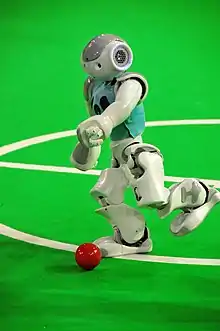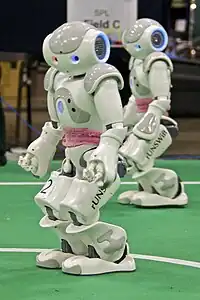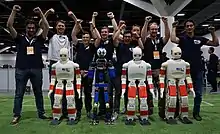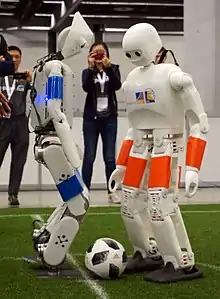RoboCup
RoboCup is an annual international robotics competition founded[1] in 1996 by a group of university professors (including Hiroaki Kitano, Manuela M. Veloso, and Minoru Asada). The aim of the competition is to promote robotics and AI research by offering a publicly appealing – but formidable – challenge.

The name RoboCup is a contraction of the competition's full name, "Robot World Cup Initiative" (based on the FIFA World Cup), but there are many other areas of competition such as "RoboCupRescue", "RoboCup@Home" and "RoboCupJunior". Peter Stone is the current president of RoboCup, and has been since 2019.
The official goal of the project is:
- "By the middle of the 21st century, a team of fully autonomous humanoid robot soccer players shall win a soccer game, complying with the official rules of FIFA, against the winner of the most recent World Cup."[2]
RoboCup leagues


The contest currently has six major domains of competition, each with a number of leagues and sub-leagues. These include:
- RoboCup Soccer
- RoboCup Rescue League
- RoboCup@Home,[4] which debuted in 2006, focuses on the introduction of autonomous robots to human society
- RoboCup@Home Open Platform League (formerly just RoboCup@Home)
- Robocup@Home Domestic Standard Platform League
- RoboCup@Home Social Standard Platform League
- RoboCup Logistics League, which debuted in 2012, is an application-driven league inspired by the industrial scenario of a smart factory
- RoboCup@Work,[5] which debuted in 2016, "targets the use of robots in work-related scenarios"
- RoboCupJunior[6]
Each team is fully autonomous in all RoboCup leagues. Once the game starts, the only input from any human is from the referee.[7]
RoboCup editions
| Number | Year | Host City | Host Country | Number of teams | Number of countries | Number of participants |
|---|---|---|---|---|---|---|
| 1 | RoboCup 1997 | Nagoya | 38 | 11 | ||
| 2 | RoboCup 1998 | Paris | 63 | 19 | ||
| 3 | RoboCup 1999 | Stockholm | 85 | 23 | ||
| 4 | RoboCup 2000 | Melbourne | 110 | 19 | ||
| 5 | RoboCup 2001 | Seattle | 141 | 22 | ||
| 6 | RoboCup 2002 | Fukuoka | 197 | 29 | ||
| 7 | RoboCup 2003 | Padua | 238 | 35 | ||
| 8 | RoboCup 2004 | Lisbon | 345 | 37 | ||
| 9 | RoboCup 2005 | Osaka | 387 | 36 | ||
| 10 | RoboCup 2006 | Bremen | 440 | 35 | ||
| 11 | RoboCup 2007 | Atlanta | 321 | 39 | 1,966 | |
| 12 | RoboCup 2008 | Suzhou | 373 | 35 | ||
| 13 | RoboCup 2009 | Graz | 407 | 43 | 2,472 | |
| 14 | RoboCup 2010 | Singapore | 500 | 40 | 3,000 | |
| 15 | RoboCup 2011 | Istanbul | 451 | 40 | 2,691 | |
| 16 | RoboCup 2012 | Mexico City | 381 | 42 | 2,356 | |
| 17 | RoboCup 2013 | Eindhoven | 410 | 45 | 3,033 | |
| 18 | RoboCup 2014 | João Pessoa | 358 | 45 | 2,900 | |
| 19 | RoboCup 2015 | Hefei | 346 | 43 | 2,032 | |
| 20 | RoboCup 2016 | Leipzig | 404 | 45 | 3,500 | |
| 21 | RoboCup 2017 | Nagoya | 500 | 50 | 2,520 | |
| 22 | RoboCup 2018 | Montreal | 360 | 40 | 2,345 | |
| 23 | RoboCup 2019 | Sydney | 335 | 40 | 2,200 | |
| 24 | RoboCup 2021 | Virtual | 317 | 43 | 2,129 | |
| 25 | RoboCup 2022 | Bangkok | ||||
| 26 | RoboCup 2023 | Bordeaux |
The formal RoboCup competition was preceded by the (often unacknowledged) first International Micro Robot World Cup Soccer Tournament (MIROSOT) held by KAIST in Taejon, Korea, in November 1996. This was won by an American team from Newton Labs, and the competition was shown on CNN.[10]
RoboCup was canceled in 2020 due to COVID-19. The planned host location of Bordeaux will host in 2023.
RoboCup Asia-Pacific editions
| Year | Host City | Host Country | Number of teams | Number of countries | Number of participants | Website |
|---|---|---|---|---|---|---|
| RoboCup Asia-Pacific 2017 | Bangkok | 130+ [11] | 25 | 1000+ | ||
| RoboCup Asia-Pacific 2018 | Kish Island | |||||
| Dubai | ||||||
| RoboCup Asia-Pacific 2019 | Moscow | |||||
| RoboCup Asia-Pacific 2020 | Virtual | |||||
| RoboCup Asia-Pacific 2021 | Aichi Prefecture / Virtual |
European RoboCupJunior Championship
| Year | Host City | Host Country | Number of teams | Number of countries | Number of participants | Website |
|---|---|---|---|---|---|---|
| European RoboCupJunior Championship 2018 | Pescara | |||||
| European RoboCupJunior Championship 2019 | Hanover | |||||
| European RoboCupJunior Championship 2020 | Cancelled due to COVID-19 pandemic | |||||
| European RoboCupJunior Championship 2021 | Cancelled due to COVID-19 pandemic | |||||
| European RoboCupJunior Championship 2022 | Guimarães | |||||
RoboCup local events
2021
- RoboCup Kazakhstan, Nur-Sultan, Kazakhstan
- RoboCup Portugal Open, virtual
- RoboCup Russia Open, Tomsk, Russia
- RoboCup Brazil Open, virtual
2020
- RoboCup Japan Open 2020, virtual
- RoboCup China Open 2020, virtual
- RoboCup Brazil Open 2020, virtual
2019
- RoboCup Portuguese Open 2019, Gondomar, Portugal
- RoboCup Brazil Open 2019, Rio Grande, Brazil
- RoboCup Asia Pacific 2019, Moscow, Russia
- RoboCup German Open 2019, Magdeburg, Germany
- RoboCup China Open 2019, Shaoxing, China
2018
- RoboCup Portugal Open 2018, Torres Vedras, Portugal
- RoboCup Asia Pacific 2018, Kish Island, Iran
- RoboCup Iran Open 2018, Tehran, Iran
- RoboCup UAE 2018, Abu Dhabi, United Arab Emirates
- RoboCup German Open 2018, Magdeburg, Germany
2017
2016
- RoboCup Portugal Open 2016, Bragança, Portugal
- RoboCup China Open 2016, Hefei, China
- RoboCup European Open 2016, Eindhoven, Netherlands
2015
2014
- RoboCup Portugal Open 2014, Espinho, Portugal
- RoboCup China Open 2014, Hefei, China
- RoboCup Iran Open 2014, Tehran, Iran
- RoboCup German Open, Magdeburg, Germany
2013
- RoboCup Portugal Open 2013, Lisbon, Portugal
- RoboCup Iran Open 2013, Tehran, Iran
- RoboCup German Open, Magdeburg, Germany
2012
2011
See also
- RoboCup Junior
- Robot
- Botball
- FIRST
- BEST Robotics
- RobotCub Consortium, a humanoid robot project to study cognition via robotics
References
- "RoboCup: The Robot World Cup Initiative". RoboCup. 1995. CiteSeerX 10.1.1.49.7511.
{{cite journal}}: Cite journal requires|journal=(help) - "RoboCup: Objective". RoboCup. 1998. Retrieved 2014-01-26.
- Ficht, Grzegorz; Farazi, Hafez; Brandenburger, Andre; Rodriguez, Diego; Pavlichenko, Dmytro; Allgeuer, Philipp; Hosseini, Mojtaba; Behnke, Sven (2018). "NimbRo-OP2X: Adult-Sized Open-Source 3D Printed Humanoid Robot". 2018 IEEE-RAS 18th International Conference on Humanoid Robots (Humanoids). Beijing, China: IEEE. pp. 1–9. arXiv:1810.08395. Bibcode:2018arXiv181008395F. doi:10.1109/HUMANOIDS.2018.8625038. ISBN 978-1-5386-7283-9. S2CID 53044123.
- "RoboCup@Home – Where the best domestic service robots test themselves". RoboCup@Home. Robocup Federation, Inc. Retrieved 4 October 2022.
- "Welcome to RoboCup@Work!". RoboCup@Work. Robocup Federation, Inc. Retrieved 4 October 2022.
- "RoboCupJunior – Creating a learning environment for today, fostering technological advancement for tomorrow". junior.robocup.org. Retrieved 2018-04-16.
- "A New Goal for Open Source". Red Hat Blog. Red Hat, Inc. 20 May 2008. Retrieved 4 October 2022.
- "RoboCup WM 2016 kommt nach Leipzig". 22 July 2014.
- "RoboCup2017 Nagoya Japan(ロボカップ2017)". Archived from the original on 2017-04-04. Retrieved 2017-04-03.
- "Robot Soccer at Newton Research Labs". www.newtonlabs.com. Retrieved 2019-12-06.
- "ICCA member press release: Thailand Robotics Week 2017 & RoboCup Asia-Pacific 2017". Retrieved 2021-08-04.
- "Statement from RoboCup Federation and Bordeaux RoboCup LOC: Corona Virus (COVID-19)". www.robocup.org. Retrieved 2020-07-01.
External links
![]() Media related to RoboCup at Wikimedia Commons
Media related to RoboCup at Wikimedia Commons
- Official website
- RoboCup@Home league, aims to develop service and assistive robot technology with high relevance for future personal domestic applications.
